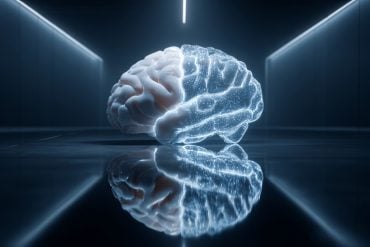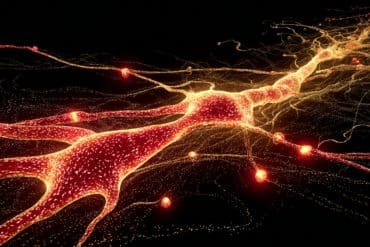Summary: Researchers uncovered how chronic stress in combination with high-calorie diets can amplify our brain’s reward system, driving overeating and weight gain. They found that stress inhibits the lateral habenula, a brain area typically curbing such reward signals. Moreover, chronic stress increases our preference for sweet, highly palatable foods. This research underscores the importance of a healthy diet, particularly during stressful periods.
Key facts:
- Chronic stress coupled with a high-calorie diet leads to overeating and increased cravings for sweet, palatable food, contributing to weight gain.
- This is due to stress overriding the brain’s lateral habenula, a region that typically dampens the reward signals associated with eating.
- Mice models showed that stressed mice on a high-fat diet gained twice as much weight as non-stressed mice on the same diet.
Source: Garvan Institute
When you’re stressed, a high-calorie snack may seem like a comforting go-to. But this combination has an unhealthy downside. According to Sydney scientists, stress combined with calorie-dense comfort food creates changes in the brain that drive more eating, boost cravings for sweet, highly palatable food and lead to excess weight gain.
A team from the Garvan Institute of Medical Research found that stress overrode the brain’s natural response to satiety, leading to non-stop reward signals that promote eating more highly palatable food. This occurred in a part of the brain called the lateral habenula, which when activated usually dampens these reward signals.

“Our findings reveal stress can override a natural brain response that diminishes the pleasure gained from eating—meaning the brain is continuously rewarded to eat,” says Professor Herzog, senior author of the study and Visiting Scientist at the Garvan Institute.
“We showed that chronic stress, combined with a high-calorie diet, can drive more and more food intake as well as a preference for sweet, highly palatable food, thereby promoting weight gain and obesity. This research highlights how crucial a healthy diet is during times of stress.”
The research was published in the journal Neuron.
From stressed brain to weight gain
While some people eat less during times of stress, most will eat more than usual and choose calorie-rich options high in sugar and fat.
To understand what drives these eating habits, the team investigated in mouse models how different areas in the brain responded to chronic stress under various diets.
“We discovered that an area known as the lateral habenula, which is normally involved in switching off the brain’s reward response, was active in mice on a short-term, high-fat diet to protect the animal from overeating.
“However, when mice were chronically stressed, this part of the brain remained silent—allowing the reward signals to stay active and encourage feeding for pleasure, no longer responding to satiety regulatory signals,” explains first author Dr. Kenny Chi Kin Ip from the Garvan Institute.
“We found that stressed mice on a high-fat diet gained twice as much weight as mice on the same diet that were not stressed.”
The researchers discovered that at the center of the weight gain was the molecule NPY, which the brain produces naturally in response to stress. When the researchers blocked NPY from activating brain cells in the lateral habenula in stressed mice on a high-fat diet, the mice consumed less comfort food, resulting in less weight gain.
Driving comfort eating
The researchers next performed a “sucralose preference test”—allowing mice to choose to drink either water, or water that had been artificially sweetened.
“Stressed mice on a high-fat diet consumed three times more sucralose than mice that were on a high-fat diet alone, suggesting that stress not only activates more reward when eating but specifically drives a craving for sweet, palatable food,” says Professor Herzog.
“Crucially, we did not see this preference for sweetened water in stressed mice that were on a regular diet.”
Stress overrides healthy energy balance
“In stressful situations it’s easy to use a lot of energy and the feeling of reward can calm you down—this is when a boost of energy through food is useful. But when experienced over long periods of time, stress appears to change the equation, driving eating that is bad for the body long term,” says Professor Herzog.
The researchers say their findings identify stress as a critical regulator of eating habits that can override the brain’s natural ability to balance energy needs.
“This research emphasizes just how much stress can compromise a healthy energy metabolism,” says Professor Herzog. “It’s a reminder to avoid a stressful lifestyle, and crucially—if you are dealing with long-term stress—try to eat a healthy diet and lock away the junk food.”
About this stress and diet research news
Author: Kenny Chi Kin Ip
Source: Garvan Institute
Contact: Kenny Chi Kin Ip – Garvan Institute
Image: The image is credited to Neuroscience News
Original Research: Open access.
“Critical Role of Lateral Habenula Circuits in the Control of Stress-Induced Palatable Food Consumption” by Herbert Herzog et al. Neuron
Abstract
Critical Role of Lateral Habenula Circuits in the Control of Stress-Induced Palatable Food Consumption
Highlights
- HFD combined with chronic stress upregulates NPY in the CeAM
- CeAM NPY neurons directly and indirectly control Npy1r-expressing LHb neurons
- LHb Npy1r neurons are glutamatergic and project to the VTA
- Npy1r signaling in the LHb drives palatable food intake in mice
Summary
Chronic stress fuels the consumption of palatable food and can enhance obesity development. While stress- and feeding-controlling pathways have been identified, how stress-induced feeding is orchestrated remains unknown.
Here, we identify lateral habenula (LHb) Npy1r-expressing neurons as the critical node for promoting hedonic feeding under stress, since lack of Npy1r in these neurons alleviates the obesifying effects caused by combined stress and high fat feeding (HFDS) in mice.
Mechanistically, this is due to a circuit originating from central amygdala NPY neurons, with the upregulation of NPY induced by HFDS initiating a dual inhibitory effect via Npy1r signaling onto LHb and lateral hypothalamus neurons, thereby reducing the homeostatic satiety effect through action on the downstream ventral tegmental area.
Together, these results identify LHb-Npy1r neurons as a critical node to adapt the response to chronic stress by driving palatable food intake in an attempt to overcome the negative valence of stress.






